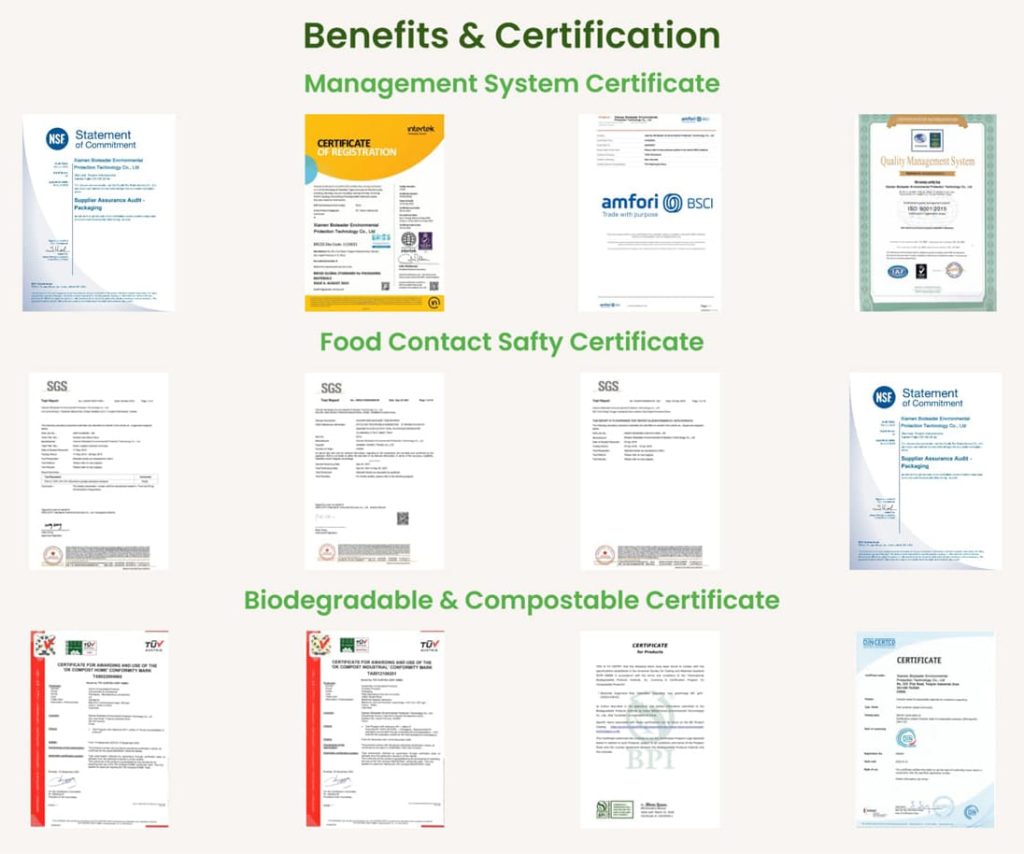Introduction
♻️ As the demand for eco-friendly packaging surges, compostable plastics have emerged as a sustainable alternative to traditional plastics. But not all products labeled as “compostable” meet the same standards. That’s where EN 13432 and ASTM D6400 come in. These two globally recognized certifications ensure that compostable packaging performs as promised—breaking down safely and completely under industrial composting conditions.
What Are EN 13432 and ASTM D6400?
📜 EN 13432 (Europe) and ASTM D6400 (USA) are the most important international standards for compostable plastics. They define the requirements and testing procedures to ensure that a plastic product will biodegrade, disintegrate, and leave no harmful residue during the composting process.

✅ EN 13432: The European Standard
Full Name: Requirements for Packaging Recoverable through Composting and Biodegradation
Scope: European Union
Key Requirements:
- 🌿 Biodegradability: At least 90% of the organic carbon in the material must convert into CO₂ within 180 days.
- 🔍 Disintegration: After 12 weeks in industrial composting conditions (58°C), less than 10% of the original mass should remain, with fragments smaller than 2mm.
- 🌻 No Ecotoxicity: The resulting compost must support plant growth.
- ⚖️ Heavy Metal Limits: Strict thresholds for metals like lead, cadmium, and mercury.
Why It Matters:
🏅 Only materials meeting EN 13432 can carry the “OK Compost” or similar certification marks in Europe.
✅ ASTM D6400: The U.S. Standard
Full Name: Standard Specification for Labeling of Plastics Designed to be Aerobically Composted in Municipal or Industrial Facilities
Scope: United States
Key Requirements:
- 🌿 Biodegradability: At least 90% conversion to CO₂ within 180 days.
- 🔍 Disintegration: After 12 weeks, no more than 10% residue larger than 2mm.
- 🌻 No Toxic Residue: Compost should be safe for plants.
- ⚖️ Heavy Metals & Safety: Must comply with limits for harmful elements.
Why It Matters:
🏅 ASTM D6400 certification is essential for products marketed as compostable plastics in the U.S.
EN 13432 vs ASTM D6400: Key Differences
| Feature | EN 13432 (Europe) | ASTM D6400 (USA) |
|---|---|---|
| 🌍 Region | European Union | United States |
| 🌱 Biodegradation | ≥90% in 180 days | ≥90% in 180 days |
| 🧩 Disintegration | ≤10% residue in 12 weeks | ≤10% residue in 12 weeks |
| ⚠️ Toxicity Test | Required | Required |
| 🧪 Heavy Metal Limits | Yes | Yes |
Both standards share similar goals—ensuring compostable plastics fully break down in industrial composting facilities without harming the environment.
Why Are These Standards Important?
❗ Without strict standards like EN 13432 and ASTM D6400, the term “compostable plastics” could become misleading. These certifications give consumers and businesses confidence that:
- ✅ The product actually biodegrades, not just fragments into microplastics.
- ✅ The compost produced is safe for soil and plants.
- ✅ The packaging aligns with global sustainability goals.
Applications of Compostable Plastics
🍽 Certified compostable plastics are widely used in:
- 🥤 Food Packaging: Compostable cups, lids, and trays.
- 🛍 Retail Bags: Grocery and produce bags.
- 🍴 Catering & Events: Disposable cutlery and plates.
At Xiamen Dashan, we provide PLA-based compostable packaging that complies with these global standards, offering safe, eco-friendly solutions for the food industry.

FAQs
1. Are compostable plastics the same as biodegradable plastics?
No. All compostable plastics are biodegradable, but not all biodegradable plastics are compostable. Compostable plastics break down under controlled composting conditions and leave no harmful residue.
2. Do EN 13432 and ASTM D6400 require home compostability?
No. Both standards apply to industrial composting, not home composting.
3. How can I tell if a product truly meets EN 13432 or ASTM D6400?
Look for certification marks from recognized organizations like TÜV Austria (OK Compost) or the Biodegradable Products Institute (BPI). These marks indicate that the product has passed the official testing process and meets the compostability requirements of EN 13432 or ASTM D6400.
Conclusion
🌍 The growing demand for sustainable solutions makes understanding certifications like EN 13432 and ASTM D6400 essential. These standards ensure that compostable plastics are truly eco-friendly—fully breaking down in industrial composting environments without leaving harmful residues. For businesses, compliance is not just about meeting regulations; it’s about building consumer trust and reducing environmental impact.
By choosing certified compostable packaging, companies can take a meaningful step toward a greener future.
References
- European Standard EN 13432https://www.cen.eu/
- ASTM D6400 Specificationhttps://www.astm.org/d6400-21.html
- European Bioplastics – Standardshttps://www.european-bioplastics.org/
- Biodegradable Products Institute (BPI)https://bpiworld.org/
- TÜV Austria OK Compost Certificationhttps://www.tuv-at.be/
